新概念英语第二册课后题答案详解:Lesson58
- 格式:docx
- 大小:38.28 KB
- 文档页数:3
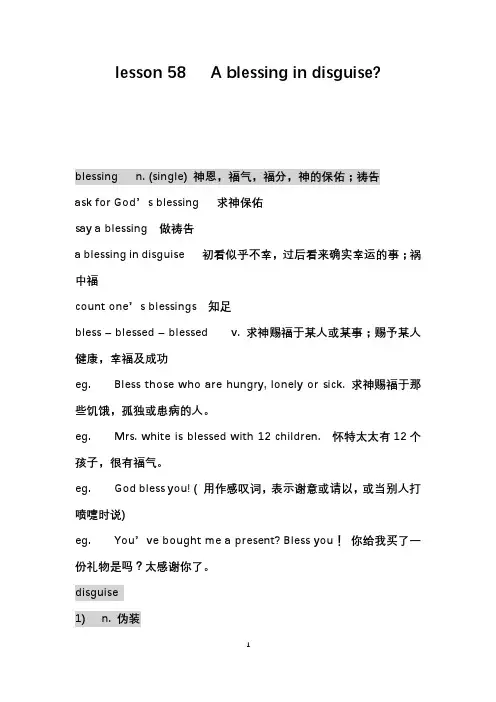
lesson 58 A blessing in disguise?blessing n. (single) 神恩,福气,福分,神的保佑;祷告ask for God’s blessing 求神保佑say a blessing 做祷告a blessing in disguise 初看似乎不幸,过后看来确实幸运的事;祸中福count one’s blessings 知足bless – blessed – blessed v. 求神赐福于某人或某事;赐予某人健康,幸福及成功eg. Bless those who are hungry, lonely or sick. 求神赐福于那些饥饿,孤独或患病的人。
eg. Mrs. white is blessed with 12 children. 怀特太太有12个孩子,很有福气。
eg. God bless you! ( 用作感叹词,表示谢意或请以,或当别人打喷嚏时说)eg. You’ve bought me a present? Bless you!你给我买了一份礼物是吗?太感谢你了。
disguise1)n. 伪装wear a beard as a disguise 戴着络腮胡子作为伪装eg. He was in disguise, so I couldn’t recognize him. 他乔装打扮过了,所以我没认出来。
eg. She made no disguise of her contempt. 她很露骨地表示出轻蔑之意。
2)v. 伪装,假扮eg. I couldn’t disguise my anger. 我无法掩饰我的愤怒。
eg. He disguised himself as a woman for fun. 他男扮女装只为了好玩。
disguise one’s voice 改变说话腔调,发假声音tiny adj. 极小的tiny – tinier – tiniestsmall 小的little 小的(含有可爱之意)mini- 构成复合词minibus 小公共汽车miniskirt 迷你裙minicab 小的出租汽车puny (贬义)弱小的,瘦小的,发育不全的,未充分发挥的eg. A tiny girl was singing very well on TV. 一个纤小的女孩在电视上唱得很好。
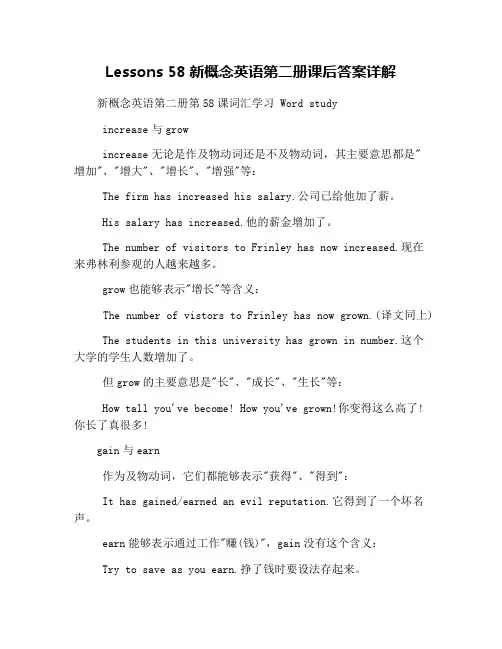
Lessons 58新概念英语第二册课后答案详解新概念英语第二册第58课词汇学习 Word studyincrease与growincrease无论是作及物动词还是不及物动词,其主要意思都是"增加"、"增大"、"增长"、"增强"等:The firm has increased his salary.公司已给他加了薪。
His salary has increased.他的薪金增加了。
The number of visitors to Frinley has now increased.现在来弗林利参观的人越来越多。
grow也能够表示"增长"等含义:The number of vistors to Frinley has now grown.(译文同上)The students in this university has grown in number.这个大学的学生人数增加了。
但grow的主要意思是"长"、"成长"、"生长"等:How tall you've become! How you've grown!你变得这么高了!你长了真很多!gain与earn作为及物动词,它们都能够表示"获得"、"得到":It has gained/earned an evil reputation.它得到了一个坏名声。
earn能够表示通过工作"赚(钱)",gain没有这个含义:Try to save as you earn.挣了钱时要设法存起来。
She earns £500 a month.她一个月赚500英镑。
gain能够表示"受益"、"获益",earn则不能够:Jane has gained much from her year in Australia.简在澳大利亚这个年获益匪浅。
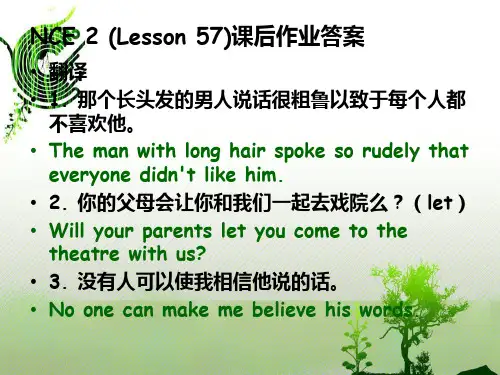
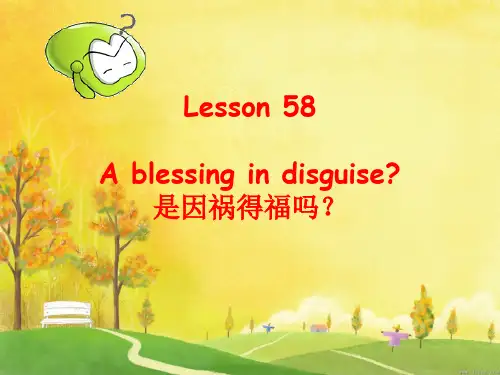
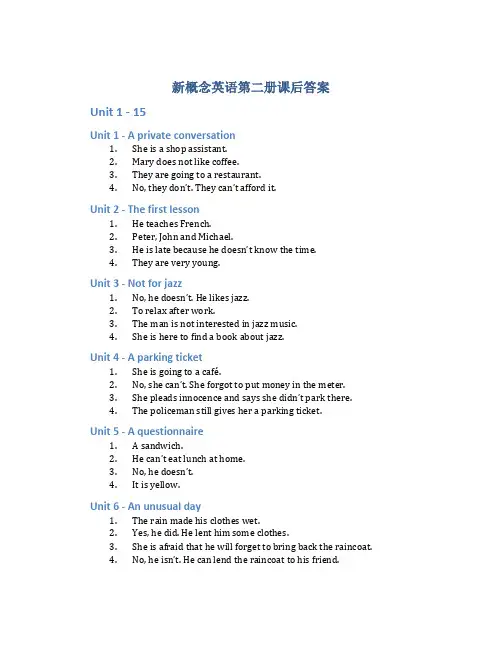
新概念英语第二册课后答案Unit 1 - 15Unit 1 - A private conversation1.She is a shop assistant.2.Mary does not like coffee.3.They are going to a restaurant.4.No, they don’t. They can’t afford it.Unit 2 - The first lesson1.He teaches French.2.Peter, John and Michael.3.He is late because he doesn’t know the time.4.They are very young.Unit 3 - Not for jazz1.No, he doesn’t. He likes jazz.2.To relax after work.3.The man is not interested in jazz music.4.She is here to find a book about jazz.Unit 4 - A parking ticket1.She is going to a café.2.No, she can’t. She forgot to put money in the meter.3.She pleads innocence and says she didn’t park there.4.The policeman still gives her a parking ticket.Unit 5 - A questionnaire1. A sandwich.2.He can’t eat lunch at home.3.No, he doesn’t.4.It is yellow.Unit 6 - An unusual day1.The rain made his clothes wet.2.Yes, he did. He lent him some clothes.3.She is afraid that he will forget to bring back the raincoat.4.No, he isn’t. He can lend the raincoat to his friend.Unit 7 - Is that you, John?1.He d oesn’t think it is John’s voice.2.He has lost his wallet on the train.3.No, he didn’t. He found £20.4.He should return the money.Unit 8 - A coffee break1.No, she doesn’t drink coffee.2.She wants to buy some milk.3.No, he doesn’t. He is going to buy some lemon t ea.4.The tea costs £1.80.Unit 9 - A matter of seconds1.In a library.2.She asked the man to return the book to the library.3.No, she doesn’t have enough money to pay the fine.4.She gets a letter from the library.Unit 10 - When were you born?1.He was born on May 5th, 1965.2.His father was born in 1935.3.Yes, he does. He is a schoolteacher.4.He is very tired.Unit 11 - The best and the worst1.In Rome and Paris.2.Rome was the most interesting place he visited.3.The weather in India was the worst.4.He doesn’t know. He hasn’t been to Switzerland. Unit 12 - New Zealand1.It is a small country in the South Pacific.2.There are three main islands.3.The capital city is Wellington.4.The people there are friendly.Unit 13 - Work and play1.He is a teacher.2.Teacher to students.3.He can’t stay with his friends because he has to work.4.He can’t. He has work to do.Unit 14 - A museum for everyone1.Yes, it does.2.They can touch everything in the museum.3.Yes, they have. They enjoyed their visit very much.4.They don’t have to pay any money.Unit 15 - Paying the bill1.They had lunch at a restaurant.2.They pay first and then have lunch.3.They forget to bring any money.4.They invite the man to have some coffee.ConclusionThe above answers are provided for the exercises in the New Concept English Book 2. Go through the questions and compare your answers with the suggested responses to check for correctness. Practicing and reviewing these exercises will help enhance your understanding of the course material and improve your English language skills.。

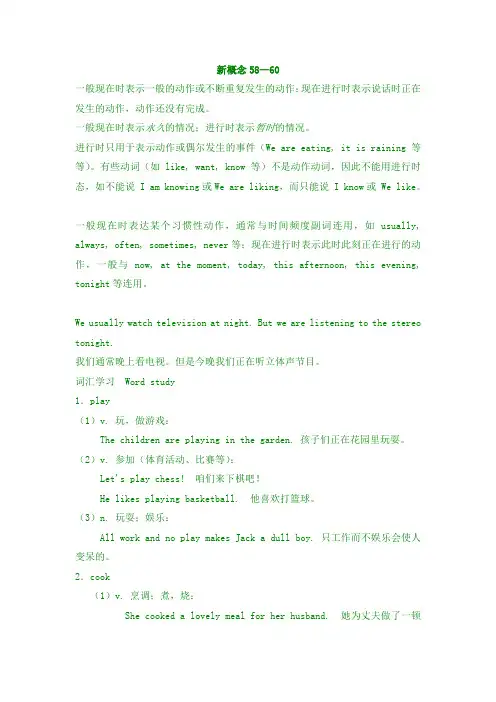
新概念58—60一般现在时表示一般的动作或不断重复发生的动作;现在进行时表示说话时正在发生的动作,动作还没有完成。
一般现在时表示永久的情况;进行时表示暂时的情况。
进行时只用于表示动作或偶尔发生的事件(We are eating, it is raining等等)。
有些动词(如 like, want, know等)不是动作动词,因此不能用进行时态,如不能说 I am knowing或We are liking,而只能说 I know或 We like。
一般现在时表达某个习惯性动作,通常与时间频度副词连用,如 usually, always, often, sometimes, never等;现在进行时表示此时此刻正在进行的动作,一般与 now, at the moment, today, this afternoon, this evening, tonight等连用。
We usually watch television at night. But we are listening to the stereo tonight.我们通常晚上看电视。
但是今晚我们正在听立体声节目。
词汇学习 Word study1.play(1)v. 玩,做游戏:The children are playing in the garden. 孩子们正在花园里玩耍。
(2)v. 参加(体育活动、比赛等):Let's play chess! 咱们来下棋吧!He likes playing basketball. 他喜欢打篮球。
(3)n. 玩耍;娱乐:All work and no play makes Jack a dull boy. 只工作而不娱乐会使人变呆的。
2.cook(1)v. 烹调;煮,烧:She cooked a lovely meal for her husband. 她为丈夫做了一顿美餐。
The beef is not cooked enough. 牛肉煮得不够熟。
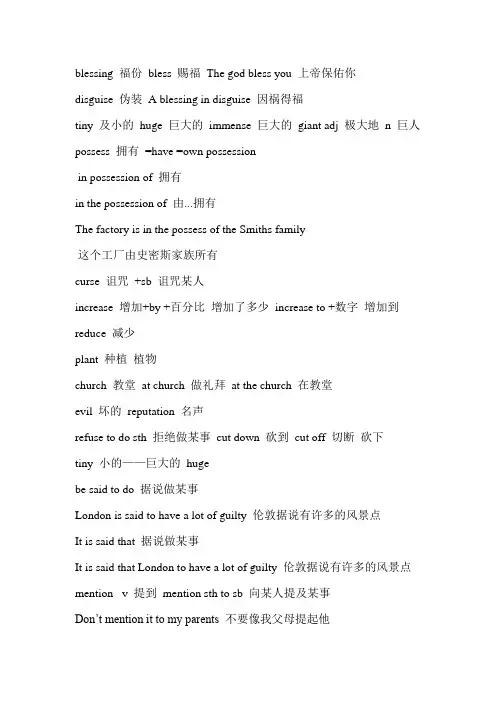
blessing 福份bless 赐福The god bless you 上帝保佑你disguise 伪装A blessing in disguise 因祸得福tiny 及小的huge 巨大的immense 巨大的giant adj 极大地n 巨人possess 拥有=have =own possessionin possession of 拥有in the possession of 由...拥有The factory is in the possess of the Smiths family这个工厂由史密斯家族所有curse 诅咒+sb 诅咒某人increase 增加+by +百分比增加了多少increase to +数字增加到reduce 减少plant 种植植物church 教堂at church 做礼拜at the church 在教堂evil 坏的reputation 名声refuse to do sth 拒绝做某事cut down 砍到cut off 切断砍下tiny 小的——巨大的hugebe said to do 据说做某事London is said to have a lot of guilty 伦敦据说有许多的风景点It is said that 据说做某事It is said that London to have a lot of guilty 伦敦据说有许多的风景点mention v 提到mention sth to sb 向某人提及某事Don’t mention it to my parents 不要像我父母提起他Your secret is save with me 我会为你保守秘密=My lips will be sealed seal 封存the number of ...的数量整体是单数a number of 整体是复数increase 增长+by +百分比增长多少increase 增长+to +百分比增加到It is /was +所强调成分+that+其他如果强调主语或所强调成分为人可用who,in the past / in the recent +时间段都引到现在完成时only加状语位于句首句子有倒装have a reputation for = have the reputation of 以..而著称fair 公平的deal 交易That store has a good reputation for fair dealing这家商店以公平交易而著称分号隔开的句子首字母不大写英语中没有书名号和冒号believe+从句表相信认为claim以...为后果导致claim to do 声称做..claim to have done声称做过He claimed to have seen the person before他声称以前见过那个男人have sth done 找人做某事。
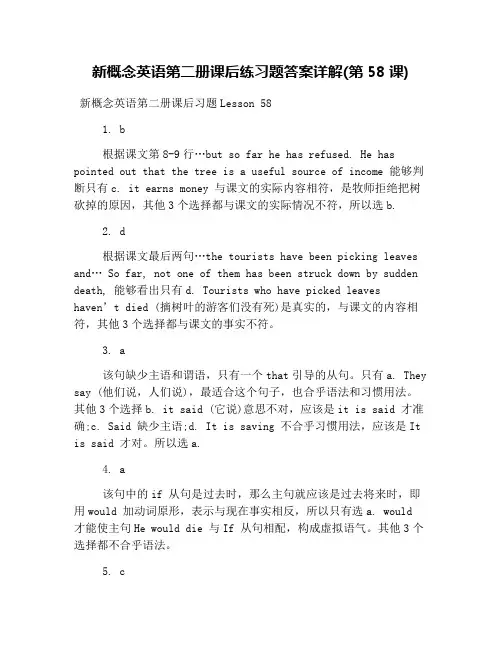
新概念英语第二册课后练习题答案详解(第58课)新概念英语第二册课后习题Lesson 581. b根据课文第8-9行…but so far he has refused. He has pointed out that the tree is a useful source of income 能够判断只有c. it earns money 与课文的实际内容相符,是牧师拒绝把树砍掉的原因,其他3个选择都与课文的实际情况不符,所以选b.2. d根据课文最后两句…the tourists have been picking leaves and… So far, not one of them has been struck down by sudden death, 能够看出只有d. Tourists who have picked leaves haven’t died (摘树叶的游客们没有死)是真实的,与课文的内容相符,其他3个选择都与课文的事实不符。
3. a该句缺少主语和谓语,只有一个that引导的从句。
只有a. They say (他们说,人们说),最适合这个句子,也合乎语法和习惯用法。
其他3个选择b. it said (它说)意思不对,应该是it is said 才准确;c. Said 缺少主语;d. It is saving 不合乎习惯用法,应该是It is said 才对。
所以选a.4. a该句中的if 从句是过去时,那么主句就应该是过去将来时,即用would 加动词原形,表示与现在事实相反,所以只有选a. would才能使主句He would die 与If 从句相配,构成虚拟语气。
其他3个选择都不合乎语法。
5. c该句是现在完成时否定式,句尾需要添一个合适的副词.a. still, b. even, d. more 都不能用在句尾,只有c. yet常用于完成时态否定句的句尾,表示"还没",所以只能选c.6. b该句中的…all that has been said 为名词性短语,前面只能有介词引导。

裕兴新概念英语第二册笔记第58课Lesson 58 A blessing in disguise? 是因祸得福吗?Why does the vicar refuse to cut down the tree?The tiny village of Frinley is said to possess a 'cursed tree'. Because the tree was mentioned in a newspaper, the number of visitors to Frinley has now increased. The tree was planted near the church fifty years ago, but it is only in recent years that it has gained an evil reputation. It is said that if anyone touches the tree, he will have bad luck; if he picks a leaf, he will die. Many villagers believe that the tree has already claimed a number of victims. The vicar has been asked to have the tree cut down, but so far he has refused. He has pointed out that the tree is a useful source of income, as tourists have been coming from all parts of the country to see it. In spite of all that has been said, the tourists have been picking leaves and cutting their names on the tree-trunk. So far, not one of them has been struck down by sudden death!参考译文据说弗林利这个小村里有一棵“该诅咒的树”。
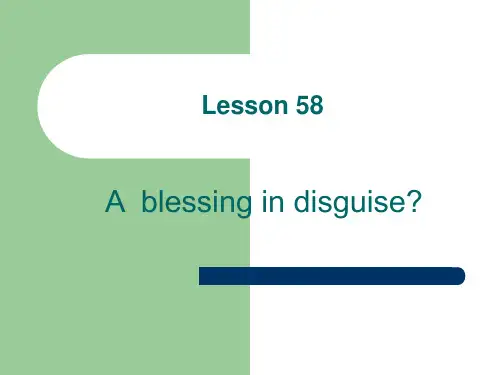
新概念英语课后练习题答案第二册:Lesson 58新概念英语第二册课后习题lesson 581. b根据课文第8-9行…but so far he has refused. he has pointed out that the tree is a useful source of income 能够判断只有c. it earns money 与课文的实际内容相符,是牧师拒绝把树砍掉的原因,其他3个选择都与课文的实际情况不符,所以选b.2. d根据课文最后两句…the tourists have been picking leaves and… so far, not one of them has been struck down by sudden death, 能够看出只有d. tourists who have picked leaves haven’t died (摘树叶的游客们没有死)是真实的,与课文的内容相符,其他3个选择都与课文的事实不符。
3. a该句缺少主语和谓语,只有一个that引导的从句。
只有a. they say (他们说,人们说),最适合这个句子,也合乎语法和习惯用法。
其他3个选择b. it said (它说)意思不对,应该是it is said 才准确;c. said 缺少主语;d. it is saving 不合乎习惯用法,应该是it is said 才对。
所以选a.4. a该句中的if 从句是过去时,那么主句就应该是过去将来时,即用would 加动词原形,表示与现在事实相反,所以只有选a. would才能使主句he would die 与if 从句相配,构成虚拟语气。
其他3个选择都不合乎语法。
5. c该句是现在完成时否定式,句尾需要添一个合适的副词.a. still, b. even, d. more 都不能用在句尾,只有c. yet常用于完成时态否定句的句尾,表示"还没",所以只能选c.6. b该句中的…all that has been said 为名词性短语,前面只能有介词引导。
【最新整理,下载后即可编辑】Lesson 58 A blessing in disguise? 是因祸得福吗?Why does the vicar refuse to cut down the tree?The tiny village of Frinley is said to possess a 'cursed tree'. Because the tree was mentioned in a newspaper, the number of visitors to Frinley has now increased. The tree was planted near the church fifty years ago, but it is only in recent years that it has gained an evil reputation. It is said that if anyone touches the tree, he will have bad luck; if he picks a leaf, he will die. Many villagers believe that the tree has already claimed a number of victims. The vicar has been asked to have the tree cut down, but so far he has refused. He has pointed out that the tree is a useful source of income, as tourists have been coming from all parts of the country to see it. In spite of all that has been said, the tourists have been picking leaves and cutting their names on the tree-trunk. So far, not one of them has been struck down by sudden death!参考译文据说弗林利这个小村里有一棵“该诅咒的树”。
Lesson 58 A blessing in disguise【Text】The tiny village of Frinley is said to possess a 'cursed tree'. Because the tree was mentioned in a newspaper, the number of visitors to Frinley has now increased. The tree was planted near the church fifty years ago, but it is only in recent years that it has gained an evil reputation. It is said that if anyone touches the tree, he will have bad luck; if he picks a leaf, he will die. Many villagers believe that the tree has already claimed a number of victims. The vicar has been asked to have the tree cut down, but so far he has refused. He has pointed out that the tree cut down, but so far he has refused. He has pointed out that the tree is a useful source of income, as tourists have been coming from all parts of the country to see it. In spite of all that has been said, the tourists have been picking leaves and cutting their names on the tree-trunk. So far, not one of them has been struck down by sudden death!【课文翻译】据说弗林利这个小村里有一棵“该诅咒的树”。
新概念英语第二册第58课:blessing in disguise?Lesson 58 A blessing in disguise?是因祸得福吗? First listen and then answer the question.听录音,然后回答以下问题。
Why does the vicar refuse to cut down the tree?The tiny village of Frinley is said to possess a 'cursed tree'. Because the tree was mentioned in a newspaper, the number of visitors to Frinley has now increased. The tree was planted near the church fifty years ago, but it is only in recent years that it has gained an evil reputation. It is said that if anyone touches the tree, he will have bad luck; if he picks a leaf, he will die. Many villagers believe that the tree has already claimed a number of victims. The vicar has been asked to have the tree cut down, but so far he has refused. He has pointed out that the tree is a useful source of income, as tourists have been coming from all parts of the country to see it. In spite of all that has been said, the tourists have been picking leaves and cutting their names on the tree-trunk. So far, not one of them has been struck down by sudden death!参考译文据说弗林利这个小村里有一棵“该诅咒的树”。
新概念英语第二册课后题答案详解:Lesson58
新概念英语第二册课后习题Lesson 58
1. b
根据课文第8-9行…but so far he has refused. He has pointed out that the tree is a useful source of income 能够判断只有c. it earns money 与课文的实际内容相符,是牧师拒绝把树砍掉的原因,其他3个选择都与课文的实际情况不符,所以选b.
2. d
根据课文最后两句…the tourists have been picking leaves and… So far, not one of them has been struck down by sudden death, 能够看出只有d. Tourists who have picked leaves haven’t died (摘树叶的游客们没有死)是真实的,与课文的内容相符,其他3个选择都与课文的事实不符。
3. a
该句缺少主语和谓语,只有一个that引导的从句。
只有a. They say (他们说,人们说),最适合这个句子,也合乎语法和习惯用法。
其他3个选择b. it said (它说)意思不对,应该是it is said 才准确;c. Said 缺少主语;d. It is saving 不合乎习惯用法,应该是It is said 才对。
所以选a.
4. a
该句中的if 从句是过去时,那么主句就应该是过去将来时,即用would 加动词原形,表示与现在事实相反,所以只有选a. would 才能使主句He would die 与If 从句相配,构成虚拟语气。
其他3个选择都不合乎语法。
5. c
该句是现在完成时否定式,句尾需要添一个合适的副词.a. still, b. even, d. more 都不能用在句尾,只有c. yet常用于完成时态否定
句的句尾,表示"还没",所以只能选c.
6. b
该句中的…all that has been said 为名词性短语,前面只能有
介词引导。
a. In spite 后面缺少介词of ,不是准确的表达方式;c. Even (甚至) 和d. Even so (虽然如此)这两个都不是介词,后面不能跟名词性短语;只有b. Despite (即使)是介词,与in spite of 意义
相同,最合乎语法,所以选b.
7. d
只有d. none 能与本句中的 of them 构成短语none of them 意
思为“没有一个”。
其他3个选择与of them 构成的短语都不合乎习
惯用法,所以都不是准确的表达方式,所以选d.
8. c
该句需要选出与前一句中的形容词tiny(极小的)意思相近的词。
a. big (大的);b. great(伟大的);c. small (小的) 和d. famous (的,有名的)4个选择中只有c. small 与tiny 意义相同,所以选c.
9. a
该句需要选出同前一句的过去分词increased(增加,增长)含义相同的词或词组。
a. grown(长大,增长), b. grown up(成长,长大),c. overgrown(长满)和d. grown old(变老)4个选择中只有a. grown 与increased 的含义相同,所以选a.
10. d
只有d. earned (得到)最合乎题目意思,其他3个选择中,a. won (赢得)指好的事情,如赢得胜利、球赛等;b. beaten (打败,击败)词意思不当;c. profited (有利于,得益于)词含义不对,所以选d.
11. b
前一句中的evil reputation 意思是“坏名声”,本句需要选一个同reputation意义相同的词。
a. fame(声誉,名望)指因为好事而获得的;
b. name(名字,名声)能够指好的也能够指坏的名声;
c. rumour (谣言,传说);
d. report(报告);
这4个词中只有 b. name 与reputation 的意义相同,所以选b.
12. d
前一句的谓语动词has pointed out that...意思是指出……,有解释陈述某一件事情的含义,该句需要选出合适的动词,使其同前一句的含义相配。
a. shown(把……给某人看), b. pointed(把……指给某人), c. noted(请注意,记下), d. explained(解释,说明)这4个选择中只有d. explained 与pointed out 的含义比较相配,所以选d.。